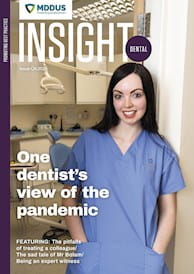
YOU might look on it as a chore, a tick-box exercise, compliance or something that has to be done after a complaint – but reflective practice has much more to offer dental practitioners.
In 2019 the General Dental Council (GDC) and eight other healthcare regulators published a joint statement on being a reflective practitioner. It defined reflection as:
“The thought process where individuals consider their experiences to gain insights about their whole practice.”
The purpose of reflection is ultimately to maintain good practice and patient safety, but there also needs to be a benefit to the dentist, such as improving job satisfaction and reducing stress. Inevitably, a work situation where a practitioner feels fulfilled and engaged and where fewer errors occur will be a less stressful one.
The use of reflection is not limited to simply what CPD you undertake or what happens after a significant event. Ideally it should encompass your whole working life. No one operates in a vacuum and how we interact with our team, what systems we employ or tools we use in daily practice can influence not only what we learn but also how well our team and we perform, and how safely we practice.
Do we have to be reflective?
In short yes.
In its Enhanced CPD guidance, the GDC places record keeping skills, knowledge and practice up to date at the heart of a professional obligation to provide safe and appropriate care. It is no longer sufficient to simply hoard certificates and do CPD on ‘core topics’ or those of interest – the GDC now advocates the plan, do, reflect, record model. This involves the development of a personal development plan (PDP) designed to be relevant to your sphere of practice. I would contend, however, that you cannot ‘plan’ until you have fully reflected.
Reflection itself has been much written about and there are a range of styles, methods and theories on the art of reflection (too many to cover in this article) but in essence in order to reflect we need:
- Time. True reflection isn’t something you can cram in between patients, nor is it something you can sustain for hours. Building in reflection time to your daily living (a few minutes regularly) is more likely to be constructive. Keeping a diary or log of your reflections will help you analyse them later, prevent you forgetting what you have thought about and assist when utilising those thoughts.
- Attention. A well-quoted study showed that 61.7 per cent of dentists thought smartphones distracted them from clinical duties, yet 88 per cent had them in the surgery. Being a reflective practitioner should demand your full attention if you are to do it well, so carve out some time to switch off the phone or email notifications and maximise your ability to focus.
- Openness. The process of reflection is not one that should make you feel bad or inadequate. Be prepared to think about your working life, human interactions and clinical skills in a non-judgemental way.
What do I reflect on?
We often associate reflection with error and significant event analysis following an adverse event, outcome or complaint. However, if we restrict the scope of our reflection we limit the benefit to ourselves and ultimately to our patients. If we apply human factors thinking to our reflection we can hopefully gain a deeper understanding of our personal, professional and technical skills needs.
People and personal factors
How do you feel in your workplace? Do you have easy and amiable interactions with your colleagues, or are there tensions and internal complaints? How are your interactions at home? It takes courage to sit and reflect on personal and professional relationships with colleagues. We can end up defaulting to our more childlike self if we feel unable to be heard. Do you feel listened to and, if not, why is that?
Consider the words of the poet Robert Burns:
O wad some Pow'r the giftie gie us
To see oursels as ithers see us!
It wad frae mony a blunder free us,
An' foolish notion:
What airs in dress an' gait wad lea'e us,
An' ev'n devotion!
- From "To a Louse"
Essentially it is difficult to know how we are really seen by others. Besides your own internal thoughts, what feedback do you get in your practice? Do you use patient feedback sheets and read them. If not, then a valuable reflective resource is being missed.
Activity factors
What tasks do you find difficult or stressful? Are there treatment modalities you avoid or always prefer to refer out of lack of confidence? If you look at your appointment book and have that heart-sinking feeling about a particular appointment type, perhaps this is food for thought. Are you experiencing stress over that molar endo because you have always hated endodontics or is it simply because you feel you lack confidence?
Environment factors
What is your working environment like? In the ‘Covid era’, our working environment has radically changed and our ability to communicate, concentrate and carry out tasks has changed. Is your environment taking a physical/mental toll and, if so, in what way?
Adverse events
Once you have reflected on these wider matters, it is worth applying the same thinking to any recent complaints or near misses. There are a variety of models and templates available for guiding this type of reflection. Not all complaints arise from adverse events. Some relate to perceived attitudinal issues or systems within the practice, and the human factors model of reflection can easily accommodate less specific adverse events and complaints.
In the end, the reflective practitioner should seek to prevent these events occurring at all, and by reflecting on the small day-to-day errors and glitches in our working life we may prevent a greater error further on. Too often we are distracted, busy, tired or all of these and reflection becomes squeezed out of our routine, allowing small errors to build until crisis point.
The truly reflective practitioner who has an established routine of reflection also has the chance to inspire reflection in their team – with staff regularly reviewing their day, what went well and what didn’t, and how they felt. Developing a reflective practice in the wider sense, utilising human factors training and resources, might be the most effective way of truly enhancing patient care, promoting a safety culture and making our working lives less stress inducing.
Recording your reflection of what has occurred in any adverse event and involving the whole team for feedback, gives you the best chance of preventing a reoccurrence. If your worst fears are realised and the GDC becomes involved, a well-written reflection soon after the event (with team involvement, outcomes and evidence of embedded learning) can go a long way to providing you with a good defence and prevent your case escalating further in the fitness to practise process.
Putting it all into practice
Putting a plan in practice, based on reflective processes, may seem overwhelming given the scale of potential information and observations – but help is available through professional mentors.
Your professional PDP should list what you want and need to learn, how it will benefit your practice and patients, and the learning outcomes – but it is also worthwhile having a more personal PDP, addressing areas of your work and personal life highlighted by reflection. You may feel you have little control over your working environment but that doesn’t mean you can’t work on how you respond to any challenges. The GDC requires us to record our PDP and CPD log but a personal PDP/reflective log or plan is for you alone.
Any reflections carried out on an incident and recorded in reflective practice should be anonymised. It is important to remember that removing a patient’s name, age, address or other personal identifiers may not be enough. Situations or events described in combination with other data may also easily identify patients, so extra care is required.
Is there a template for reflective practice?
There are a range of templates that can be used to record reflection and learning. These are based on different theories of reflection and education, and practitioners may find particular templates helpful in different situations. The Academy of Medical Royal Colleges has produced a useful toolkit on reflective practice.
For example, the work of Donald Schön uses both “reflection in action”, and also “reflection on action”. Reflection in action means the practitioner must consider what they were thinking and feeling at the time, and what was influencing that thinking. Reflection on action guides the practitioner to consider the situation again subsequently, having had time to decompress, calm, and with the benefit of hindsight.
Other templates, such as that based on the Gibbs reflective cycle, ask a practitioner and trigger them to analyse what they did, how they felt and what impact it has had. Templates involving a cycle are useful because they force further learning and reflection, simply by their cyclical nature.
A useful guide to adopting a human factors approach to significant event analysis has been published by NHS Education for Scotland. MDDUS members can also login to watch our training & CPD team's on-demand human factors webinar that looks at delivering feedback and challenging behaviours.
I would encourage practitioners engaged in reflection not to feel constrained to one model or another but rather to utilise resources from a variety of models to reflect in a way that is most productive for them.
Five key points on being a reflective practitioner
- Reflection is personal and there is no one-way to reflect. A variety of tools are available to support structured thinking that helps to focus on the quality of reflections.
- Making time for regular reflection can have a positive impact on your wellbeing, professional life and team working. Be prepared to reflect widely and not only on what CPD you need to undertake or on what has gone wrong. Remember the positives.
- Taking a human factors systems-based approach to reflecting on adverse events or complaints will depersonalise the process and encourage you and your team to engage, reflect and discuss openly and honestly what has happened when things go wrong. It also gives you and your team the best chance of preventing the event in the future.
- If you get stuck trying to act on your reflections consider a professional dental mentor.
- Reflective practice can be ‘the giftie gie us’ providing us with insight and opportunity; it doesn’t need to be another burden.
Dr Rachael Bell is a dental adviser at MDDUS
This page was correct at the time of publication. Any guidance is intended as general guidance for members only. If you are a member and need specific advice relating to your own circumstances, please contact one of our advisers.
Read more from this issue of Insight Dental

Save this article
Save this article to a list of favourite articles which members can access in their account.
Save to library


